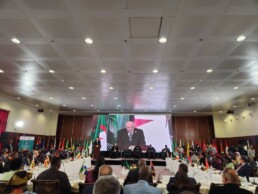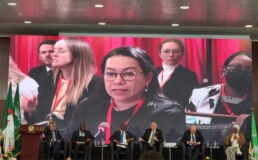How Africa is using the A3 as a de facto permanent power block in global peace and security decision-making
Date | 21 December 2023
Solomon Ayele Dersso, PhD
Founding Director, Amani Africa
On 17-18 December, the African Union (AU) held the 10th high-level seminar on peace and security in Africa, also known as the Oran Process. As someone who participates in a variety of high-level policy meetings, a question that focused my mind when I travelled to Oran, Algeria was whether and how this seminar matters.
It was in 2013 that the high-level seminar was inaugurated. Since then, it became a statutory meeting of the Peace and Security Council (PSC) of the African Union (AU) convened at the level of ministers. From all other similar policy meetings of the AU, this is unique and special in the strategic importance of its core focus – the role of the African three members of the UN Security Council (A3) as a mechanism for projecting Africa’s influence in UNSC decision-making.

It was during the signature segment of this year’s seminar that it became evident to me why and how this seminar matters. The making of the African three members of the UNSC into the collective A3 and its transformation over the years into a power block in the UNSC are closely linked to this seminar.
Angola’s Foreign Minister, Tete Antonio, who was the Permanent Representative of the AU to the UN in 2013, told attendees that the trigger for the Seminar and the making of the A3 into such power block was the opposing policy position advanced by the PSC and the African 3 members of the UNSC on the situation on Libya in 2011. While the PSC in a session of 10 March 2011 adopted a roadmap for the resolution of the crisis in Libya which rejected the use of force, the African members of the UNSC at the time voted in favour of Resolution 1973 that authorized the enforcement of a no-fly zone on Libya.
As the mandate of civilian protection under Resolution 1973 quickly turned into a campaign for regime change, the overthrow of Ghaddafi facilitated by NATO air campaign pushed Libya into chaos, unleashing dire consequences for the Sahel and beyond which continues to reverberate to this day. Former US President Barack Obama admitted the Libya debacle as the worst mistake of his tenure.
AU officials at the time came to recognize this experience as emblematic of the peril that divergent policy positions by the PSC and the African three members of the UNSC entails. A decision was taken for avoiding a repeat of it. The PSC, meeting at the level of Heads of State and Government, at its 397th meeting, called for ‘greater consultations between the PSC and the African members of the UN Security Council, to ensure that decisions adopted by the Council are effectively promoted and defended in the UN Security Council’.
Subsequently, the AU Assembly in Decision Assembly/ AU/Dec.598 (XXVI) adopted in January 2016 explicitly inscribed the A3’s ‘special responsibility to ensure that the decisions of the PSC are well reflected in the decision-making process of the UNSC on peace and security issues of concern to Africa.’ Observing the significance of this, Ahmed Attaf, Algeria’s Foreign Minister, said it is quite an achievement that we are the only region that can instruct and require its members in the UN Security Council to work as collective representing Africa and on behalf of the collective interest of Africa.
I learned from exchanges with officials present during the inaugural seminar how the A3 was coined to operate as a collective mirroring the major blocks in the UNSC such as the P5 and the P3. However, it was in the subsequent years that the A3 evolved into a power block with influence in UNSC decision-making.
Indeed, over the years the operation of the A3 as a collective body substantially enhanced. As Nabil Ammari, Tunisia’s Foreign Minister who shared Tunisia’s experience as a member of the A3 pointed out, the A3 speak with one voice in the UNSC by delivering a joint statement. For example, in 2022, the A3 (Gabon, Ghana and Kenya) delivered joint statements ‘at 63 formal meetings, primarily on country-specific agenda items focusing on the African region.’ This is a marked increase from the 35 joint statements they delivered in 2020 as highlighted in our research report. The A3 also negotiate as a block on the various outcome documents or products of the UNSC.
From the presentation by Fatima Kyari Mohamed, AU Permanent Representative to the UN, it is also clear that increasingly expanding systems and processes are instituted for enhancing A3 common position and the leverage of the block in the UNSC. These include the institutionalization of the quarterly rotating coordinator of the A3 from members of the group, the convening of a retreat of the A3 by the Permanent Mission of the AU to the UN and quarterly reporting to and exchange with the Africa Group.
The operation of the A3 as a unified body representing the collective voice of Africa as expressed through the PSC has far exceeded the initial motivation of avoiding the pursuit of divergent positions by the PSC and the A3. It has since transformed in to an instrument for negotiating power and projecting influence in UNSC decision-making.
As the current coordinator of the A3, Ghana’s Permanent Representative to the UN, Harold Agyeman, gave the example of how the A3 by ‘the persuasive power of our common action and the sheer force of our common determination’ secured the easing or removal of sanctions imposed on the Central African Republic, Democratic Republic of Congo and Somalia.
As the representative of Namibia in his intervention during the signature segment of the seminar pointed out, echoing a framing first used in Amani Africa’s work, the influence of the collective action of the A3 can go as far as operating as a de facto veto power. Indeed, with the institutionalization of the A3 as a collective body backed up by robust institutional memory and support by the AU mission and enhanced and systematic coordination between the A3 and the PSC, the A3’s potential to operate as a de facto veto power and permanently representing Africa’s collective interest is as yet to be fully tapped.
Pending the reform of the UNSC, the A3 is the instrument on which African countries need to invest in for consolidating Africa’s agency in peace and security decision-making in the UN system. Apart from historical affinity, it is the leverage that the operation of the A3 as a collective that attracts elected members of the UNSC from the Caribbean to join the A3 in the A3+1 group. Guyana, which participated in the seminar in Oran, is the second country to be part of the A3+1 since the constitution of this enlarged body when Saint Vincent and the Grenadines was a member of the UNSC.

While acknowledging the significance of the transformation of the A3 into such a power collective entity in the UNSC, participants of the seminar displayed their awareness that consolidating the A3 and exercising their influence as a collective would not be easy, particularly in the current global geopolitical environment. More importantly, the influence of the A3 needs to be exercised for securing the human security needs of the peoples of the continent rather than being used to shield authorities engaged in mass atrocities from international scrutiny. In this regard, the test of the role of the A3 today is whether they exercise their collective voice for mobilizing effective action in the UNSC for saving Sudanese from mass atrocities, displacement and starvation and the Sudanese state from the imminent threat of collapse.
The content of this article does not represent the views of Amani Africa and reflect only the personal views of the authors who contribute to ‘Ideas Indaba’